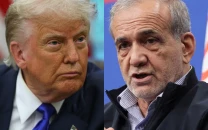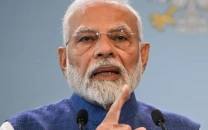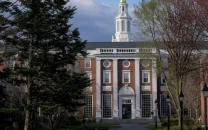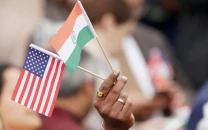Secret files show US knew about Indonesia massacres
Historians say up to 500,000 alleged Indonesian Communist Party [PKI] supporters were killed

President Sukarno wags a finger at General Suharto in 1966, months before Suharto would topple Sukarno. PHOTO: AFP
The 39 recently declassified US Embassy documents cover the period from 1964-1968, at the peak of the Cold War, and uncover new details about one of the most tumultuous periods in modern Indonesian history.
Historians say up to 500,000 alleged Indonesian Communist Party [PKI] supporters were killed between October 1965 and March 1966 by soldiers and civilian militias after the army launched a campaign to crush the Indonesian communist party and its leaders following a failed coup.
Indonesia's first female would-be suicide bomber jailed
General Suharto, who put down the coup, blamed the Indonesian Communist Party and rose to power on the back of the bloodshed, going on to lead the world's most populous Muslim nation with an iron fist for three decades.
During his rule, the massacres were presented as necessary to rid the country of communism - Indonesia had the world's third-biggest communist party after China and the Soviet Union before the killings.
The declassified documents show how American officials across the archipelago knew of the massacres, including the complicity of prominent Muslim civil society groups in the killings.
In one telegram sent from the city of Surabaya on November 26, 1965 the US consul said the number of reports coming in from East Java were an "indication [of] widespread slaughter" adding as many as 15,000 communists may have been murdered in a single massacre.
A month later the same consul said communist prisoners held by the military were being "delivered to civilians for slaughter". Other victims were "taken out of populous areas before being killed and bodies are buried rather than thrown into river."
A cable the same month from the US consulate in Medan, on the western island of Sumatra, detailed how religious preachers described the killings as an 'obligation'.
The cable said preachers from Muhammadiyah said communists were the "lowest order of infidel, the shedding of whose blood is comparable to killing chicken".
Human rights activists urged the US and Indonesia to disclose all remaining classified documents on the massacres. "Those classified documents are crucial to an accurate historical record of the killings and to provide justice for those crimes," Human Rights Watch's Andreas Harsono told AFP.
The release of the new material comes during a current surge in anti-communist hysteria in Indonesia, stoked by hardliners and some politicians.
Public debate about the killings is still taboo in many quarters.
The government has taken some steps towards reckoning with the past by backing for the first time public discussions into the killings - attended by survivors and members of the military. But those moves have also sparked a backlash from the military and police.
Last month an angry mob broke up an event organised by human rights lawyers that they believed was a discussion about communism. Five police officers were injured.



















COMMENTS
Comments are moderated and generally will be posted if they are on-topic and not abusive.
For more information, please see our Comments FAQ